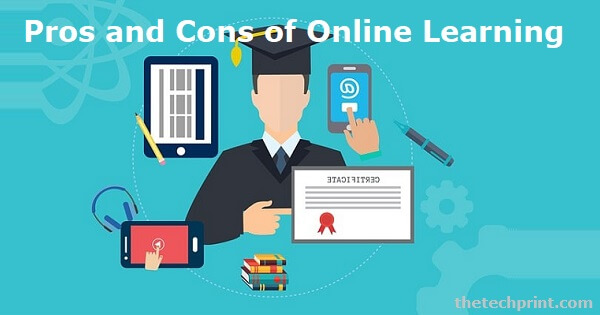Many people used to believe that online education isn’t as effective as offline learning methods. But, the COVID-19 pandemic pushed the world to think of digital learning as the new normal. Educational institutions worldwide are now turning to online learning platforms to continue educating students. E-learning has become an essential resource for students and schools. It has transformed the concept of education and is a new way of teaching that many schools have had to adopt. However, there are still many arguments surrounding the pros and cons of online learning. Here is a look at both sides of the spectrum.
The major advantages of online learning include:
When you think of e-learning, convenience comes as one of the biggest advantages of e-learning. Be it study material or online classes, you have the freedom to access it from anywhere. You can communicate with the trainers during live sessions, download the course material and even submit your assignments to the college/university portal.
With online learning, classes can be taken anytime and anywhere which provides the student with unprecedented flexibility in terms of his/her timing and location for studying.
Online courses are usually cheaper than traditional programs because there is no need for physical infrastructure like classrooms or laboratories. Online courses also tend to come with more affordable tuition rates than traditional ones.
Self-paced courses are ideal for busy students who need flexibility in their study plans and require more time to absorb material than traditional classes allow. Online learning also provides additional resources to help you move through the material if you need help or clarification. Self-paced learning allows you to take breaks when needed and come back with fresh perspectives on whatever topics you are studying.
With online learning, students can access course materials from anywhere in the world which means that they don’t have to limit themselves by geographical boundaries in order to pursue their educational goals.
Going all digital has its benefits for every learner from collegiate to professionals. But there are certain challenges that you can count as potential disadvantages of online learning.
Learning in a traditional school setting allows students to interact with their peers and teachers regularly, which helps foster meaningful relationships and encourages collaboration among classmates. In an online environment, however, human interaction is limited or non-existent. With this face-to-face contact, students may connect with their instructors and fellow students and build meaningful relationships outside of the digital classroom. This can make it difficult for many learners to stay motivated and engaged throughout the coursework.
From slow or unreliable internet connections to a lack of technological knowledge, there are a variety of problems that can arise. These technical difficulties can often be disruptive and limit the success of an online course.
Many students may not have access to the hardware or software required for an online course, further exacerbating these issues. And if instructors do not use effective instructional methods and strategies for presenting content online, students may struggle to understand concepts due to ineffective delivery.
Students may need help keeping up with their coursework when taking an online class. Students can stay motivated and engaged with direct interaction with the instructor or classmates. Particularly in asynchronous classes, where students are not meeting simultaneously each week, it can be hard to stay on track without regular deadlines and reminders from a teacher or peers.
Online courses can also lead to feelings of social isolation for some students. There is no physical classroom environment, so interacting with others can be more challenging than traditional on-campus courses. Additionally, without the face-to-face contact that in-person courses provide, some learners may experience a lack of connection to their instructors and classmates.
It can be difficult to monitor a student’s progress in an online learning environment since the teacher or classmates are not physically present. This can lead to difficulties in ensuring that students absorb and understand the material.
Conclusion
Online learning is a viable option for those who either cannot or do not want to attend traditional classes. With the right amount of discipline and organizational skills, online courses can be just as successful as traditional courses, if not more so. For those struggling to keep up with the demands of traditional classes, online courses offer more freedom and flexibility to better balance their life outside of school.
On the other hand, taking an online course may present its own limitations depending on the student’s individual learning style. Without being in regular person-to-person contact with professors, tutors, and peers, students may miss out on valuable feedback and support. To decide which type of schooling works best for them, prospective students should take the time to consider their own lifestyle needs in addition to the content that each format provides.
All in all, success in any form of education depends heavily on the student’s commitment and willingness to learn. It doesn’t matter whether it’s done virtually or traditionally.

Online learning allows professionals to access programs from schools worldwide, giving them the flexibility to find a program that suits their needs without having to relocate. On-campus students, on the other hand, are limited to local options or must move to another city to attend a full-time program.
Being in a traditional classroom setting can help you focus better on your learning without the distractions of being at home. Additionally, the familiarity of a traditional classroom may make you feel more comfortable and facilitate easier learning.
The flexibility, variety of programs, accessibility, personalized learning experience, and cost efficiency make online learning the future of education.
Students can easily access course materials anytime and anywhere, using any device. They will have the flexibility of attending online classes from the comfort of their own space without being confined to classrooms.